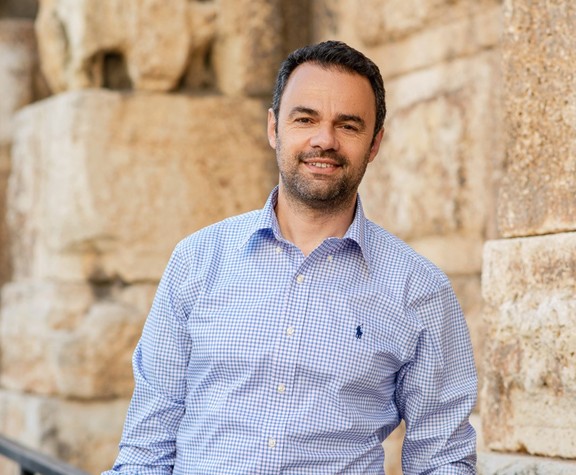
“I enjoyed the freedom we had in this class,” commented one student on the end-of-term course evaluations for Arthur Antonopoulos’s course in Ethical, Legal, and Professional Issues in Clinical Psychology, and the student continued, “the professor was in full control.”
At first glance, this student’s remark about freedom and control might seem like a contradiction. But for those who took Arthur’s course, it well encapsulates what made the class so impactful. While the structure of the course and Arthur’s guidance was clear, the students felt empowered to explore ethical dilemmas, debate professional challenges, and reflect deeply on their own values—all within an environment designed to encourage engagement and personal growth.
A seasoned educator, published author, and mental health consultant, Arthur takes an innovative approach to teaching psychology, one rooted in adaptability and genuine care. Rather than simply delivering material, he shapes each class around the needs of his students, creating a dynamic space where discussion, self-reflection, and real-world applications take center stage. Perhaps that’s why students consistently rate his classes so positively.

Creating a Safe Space for Ethical Exploration
From the very first day, Arthur sets the tone by emphasizing that his classroom is a safe place—a space where students can express ideas, challenge their own assumptions, and even change their minds. “All of my lessons are a safe place,” he explains. “That means students can say something and then a few minutes later, take it back. They can say something and take it back a few days later, a few weeks later.” This openness to rethinking and refining perspectives is essential in a field where ethical decision-making is rarely black and white.
To deepen their understanding, Arthur asks students to keep an ethics journal, a private reflection exercise where they document real-life ethical dilemmas they encounter throughout the semester. These journals are never graded or reviewed, allowing students to write freely. The impact, however, becomes evident at the course’s conclusion, where students reflected on how they felt they had grown from an ethical perspective—a highly emotional moment for all students, as he recalls.”
Engaging Learning Through Role-Play and Real-World Scenarios
Arthur’s courses go beyond theoretical discussion—students actively experience ethical challenges through hands-on learning. One effective example is role-playing, where students design and act out scenarios that bring ethical dilemmas to life. In one exercise on cultural competency, students worked in groups to develop dialogues set in everyday environments—cafeterias, public transportation, or workplaces—exploring issues like racial bias and discrimination. By embodying different perspectives, students gained a more profound understanding of ethical conflicts in professional and social settings.

Building a Collaborative and Adaptive Classroom
Even in larger classes, Arthur fosters a sense of connection and collaboration. He says he pays close attention to classroom dynamics, ensuring that group work is productive and inclusive. “You need to understand who can collaborate, which groups can work together,” he says. “Not every class naturally forms a cohesive community, so you have to be diligent,” Arthur comments.
Creating such a community is work in progress in each class. Arthur makes it a point to know every student’s name as soon as possible and to use it when greeting students as they enter and leave. He models the behavior he wants to see—acknowledging their efforts, connecting comments that students make, thanking them for participating—with the aim of fostering a respectful and engaged learning environment. Over time, this creates a culture where students mirror his approach, building a classroom community grounded in mutual respect.
His attentiveness also allows him to adjust class activities based on student needs, keeping discussions engaging and relevant. “If a particular task engages them,” he says, “I build on it. If not, I shift directions.” The same flexibility applies to course assessments.
(This same attentiveness arguably informs his writing as well. His novel Dark Athens, the first in a trilogy—published in Greek and in an English translation—details a young journalist's search to uncover the truth behind in a 3000-year-old mystery. The second in the series is due out at the end of the year.)
The Power of Genuine Care
More than any specific technique, Arthur credits the success of his teaching to one principle: genuinely caring. “I care about myself, I care about my students, I care about our community,” he says. “If you care, you’re less rigid. You’re malleable. You can move left and right. And when students see that, they’re more willing to learn.”
Arthur’s Ethical, Legal, and Professional Issues in Clinical Psychology course is more than just a class—it’s an immersive experience in ethical reasoning, self-reflection, and collaborative learning. By blending structure with flexibility, and expertise with empathy, Arthur ensures that his students don’t just learn about ethics—they live it.